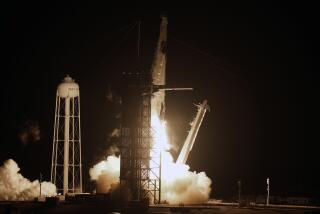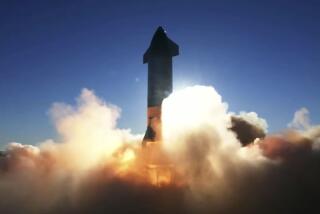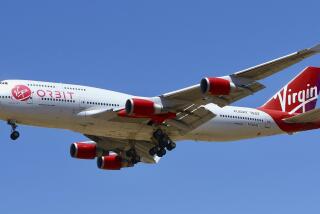Sky’s No Limit as Firm Seeks Ad Space on Soviet Rocket
- Share via
The Soviet Union is learning well the ways of capitalism--perhaps too well for the tastes of some Western businessmen.
A Los Angeles corporation, International Consolidated Trading Co., has joined the ranks of those trying to negotiate an exclusive deal with the Soviets to place advertising for the first time on a vessel launched into space.
Barry Smith, an attorney and one of the company’s owners, said Wednesday that he and his partner, developer Michael D. White, have “a contract in hand” giving them “exclusive rights” to be the first advertiser in space when the Soviets make their Aug. 30 launch of the spacecraft Soyuz TM.
But a Swiss advertising agency, a British advertising conglomerate and a small Houston marketing firm also contend that they have similar deals with the Soviets.
In response to inquiries from The Times, Soviet officials in Moscow would not confirm the Los Angeles deal nor discount the other companies’ claims. On Tuesday, Boris B. Pavlov, an official at Glavkosmos, the Soviet space agency, told The Times that he had no knowledge of a contract between a Western company and the space agency or the Soviet licensing agency, Licensintorg.
The idea of placing ads on U.S. spacecraft was proposed a decade ago. But NASA has deemed the idea inappropriate.
Still, just being associated with space has proved an advertising bonanza for U.S. companies. Where would the powdered orange drink Tang have been without U.S. astronauts who drank it as they orbited overhead?
Whoever advertises on the Soviet craft--which will carry at least two cosmonauts to Mir, the Earth-orbiting Soviet space station--can expect to generate millions of dollars for the company and the Soviets, Smith said.
Smith said he is “absolutely confident” that the deal with his company is set. He said he has received a contract from the Soviets “both in English and Russian.”
The basic idea, Smith said, was to sell the Soviets on the notion of commercializing the space program, much as was done during the Olympic Games in Los Angeles. A business would buy advertising space and place logos in areas that are easily visible to a television audience.
Smith was clearly distressed when he heard that another deal for the Aug. 30 flight had been struck between the Soviets and the Swiss advertising agency, Punto S.A.
He said he warned the Soviets, “Don’t double deal with me.”
As far as the British and Houston efforts are concerned, Smith assumes that those are limited to a planned 1991 joint British-Soviet launch.
“They (the Soviets) swore to me” that this was an exclusive deal, Smith said. “I believe them.”
Smith said the chosen sponsor will be allowed to place an ad on the space capsule, where the cosmonauts are located during their flight.
He also said the company will be able to put its name in information bulletins and press releases and be allowed to film cosmonauts before the flight. Trademarks and logos also can be placed on the uniforms of space agency personnel and at the space control center.
The only limitation, Smith said, is that neither alcohol nor tobacco can be promoted. Both are social and health problems in the Soviet Union.
Smith has said that he and his partner have guaranteed the Soviets a payment in the “seven figures.” Meanwhile, Smith and White are locked in bidding negotiations over the rights to this advertising.
The first person Smith said he thought to ask was Donald J. Trump, New York’s most visible and colorful real estate magnate. Trump said no.
Smith said he is now negotiating with five companies: an oil company, a consumer products corporation, an automobile manufacturer, a food company and a major television network. Who are they? Smith would not disclose the names, saying only that bidding will be open until early August.
Times staff writer Michael Parks in Moscow contributed to this article.
More to Read
Inside the business of entertainment
The Wide Shot brings you news, analysis and insights on everything from streaming wars to production — and what it all means for the future.
You may occasionally receive promotional content from the Los Angeles Times.










